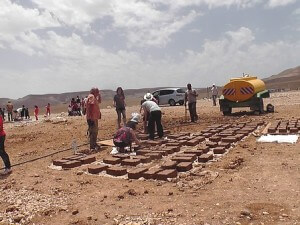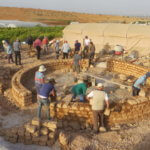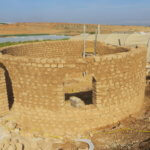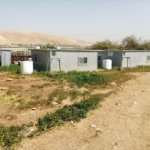Sustainable building: mud bricks & renewable energy
Bedouin communities have historically had a very low impact on the environment in which they live, using resources that were accessible, and living on land that could provide for their essential needs, such as water, grazing for their animals, and fuel. However, the repression of bedouin communities by the Occupation, and its drive to force them from their land, has destroyed many traditional practices.
Jordan Valley Solidarity has been re-introducing long established construction methods back into our communities (such as building mud brick houses) and introducing newer sustainable technology in keeping with this. This gives communities that are faced with ethnic cleansing the means to be able to stay on their land (using resources which are available and cheap) and preserves the natural environment for future generations.
This is in stark contrast to the Israeli settlements that surround our communities, which are destroying the environment by over extraction of water, industrial scale farming heavily reliant on fertilisers and pesticides, and introduction of non-indiginous plants and animals. Their waste products, such as raw sewage and huge amounts of rubbsih are then discharged onto land right next to Palestinian communities.
As time goes on we are trying out different methods that best suit the local communities and use materials that are available locally. We have worked with local communities to build houses, schools and community buildings with mud bricks. More recently we’ve built two anaerobic digestors (bio gas reactors) and a solar oven.
Why are we using using mud bricks and sustainable building technology?
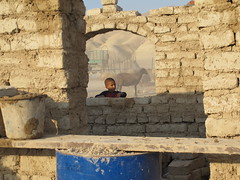
Due to discriminatory, apartheid planning laws many Palestinians in the occupied Jordan Valley live in poor housing conditions. Especially in area C, many live in tent structures made of plastic, cloth sacks, wood and bits of metal. These conditions are inadequate and families suffer from wet and cold in winter and very high temperatures in the summer. Communities living in area C often suffer from lack of services as Israeli occupation forces prohibit permission to build anything. In addition, Israeli control/theft of water means many communities living in area C struggle to simply exist on the land where their families have lived for generations.
Building with mud bricks
We use this method because:
- Communities with little resources can build permanent structures using the soil beneath their feet. It is ecologically sustainable and the building can be done using the natural resources surrounding the area. Mud brick structures keep the temperature relatively cool when it is hot outside and insulate warmth at night.
- It takes many people and a lot of energy so part of our strategy is to mobilise the community to resist discriminatory planning laws and other aspects of the occupation which seeks to force them from the land – destroying their cultural identity in the process.
- Building permanent structures where everybody says it is impossible provides inspiration for people in the community and others living in similar conditions. Direct action of this nature pressures NGOs and international donors who for a number of reasons, generally refuse to work in area C.
 We create the space where international volunteers can directly support the community in establishing the right to build their own infrastructure. This raises international awareness about the struggle of this particular community to exist, the wider structural causes and how they can join the international movement to allow Palestine their right to self determination. Practical international solidarity directly challenges the Israeli strategy of isolating the community both physically and psychologically. Personal relationships which develop after spending time working with the community become a source of strength and motivation for all involved.
We create the space where international volunteers can directly support the community in establishing the right to build their own infrastructure. This raises international awareness about the struggle of this particular community to exist, the wider structural causes and how they can join the international movement to allow Palestine their right to self determination. Practical international solidarity directly challenges the Israeli strategy of isolating the community both physically and psychologically. Personal relationships which develop after spending time working with the community become a source of strength and motivation for all involved.- Since the year 2000 only 6% of all applications for construction permits in the Valley have been approved, making it effectively forbidden for Palestinians to build in Area C, which constitutes 95% of the Jordan Valley.
- By defying Israeli permit laws we reject Israel’s policies of ethnic cleansing in the Jordan Valley, and helps Jordan Valley residents remain steadfast on their land.
- By continuing a tradition Palestinians have used for centuries, the housing projects reaffirm the historical legacy of Palestine’s indigenous population, and their rightful claim to the land they inhabit.
If we have lots of able volunteers we can make 250 bricks in one working shift. It takes 4000 to build a standard two-room house. Unfortunately, in the communities where we work, the vast majority of men and boys work on nearby settlements. This means they have to work outside normal working hours. International volunteers bring additional energy and motivation which makes building a house from mud bricks viable.
Bio gas reactors – creating fuel from waste materials

In December 2011 we built our first bio-gas reactor (anaerobic digestor) in a bedouin home in Furush Beit Dejan. The construction process was straight forward, the inexpensive materials can be sourced locally, and the reactor will provide gas for domestic use.
Biogas technology is a simple process, using manure and water to create gas and fertiliser. The reactor is constructed of a cylinder made from concrete, a base of concrete to avoid leakages, a floating drum to adapt the existing internal pressure and 2 pipes (outlet and inlet). It operates in a very simple way and doesn´t need any compression or any external control.
Volunteer Mohammed commented: “It’s good because we can cook food and do anything with the gas. After we get the system working we can build them in other homes. Gas won’t cost money any more, all we need to do is add water and the amount needed is normal.”
JVS volunteer Carlos said he initiated the action because: “Getting kerosene gas is complicated in the valley. It is expensive and takes 2-3 hrs to collect, so this was the perfect place to work. Gaining experience in Nepal was another reason to do it and I had some money to be invested. After 3 years volunteering in the valley I finally found something where my engineering is useful!
Our solar oven: why buy gas when you get the sun for free?
In our community house we are now cooking our meals in a giant cardboard box lined with tin foil. We just put it out in the sun. As the sun rays pass through the glass lid and reflect on the tin foil inside, they heat up the inside the box, and cook our dinner for us.
As one of our volunteers said: “Using solar oven is a sustainable way of cooking as you basically use scrap materials, such as cardboard boxes and glass sheet, and the free energy from the sun. The Jordan Valley’s climate is perfect for this as there are barely any overcast days and it’s getting really hot here during the summer.”
Go to a more in depth report on the solar oven
Pedal Power
It’s rare thing to see a bicycle in the Jordan Valley, which really isn’t surprising. As part of its apartheid planning system, the occupation refuses permission to Palestinian communities in Area C to lay tarmac roads. Whenever roads are laid, the Israeli military bulldozers will inevitably come to destroy them. So, the roads built for use by the illegal Israeli settlers are tarmac, and those for Palestinians in 95% of the Jordan Valley are stony dirt tracks. The only Palestinian communities permitted to have tarmac roads are Jericho and the 6 villages designated as area B.
Thus, cycling can be a challenge. However, with absolutely no buses for Palestinians in the Jordan Valley, and very limited shared taxi services, getting about can be difficult. So, although its rare to see a bicycle in the valley, that’s about to change. Jordan Valley Solidarity have now got 10 bicycles in the community house, to make it much easier for international volunteers to get from A to B, with zero impact on the local environment.

